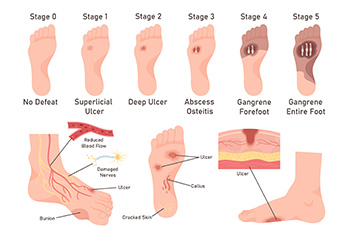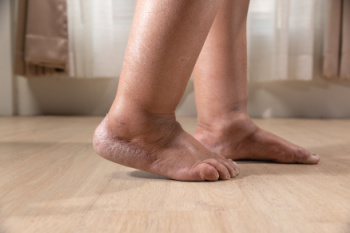Connect With Us
Blog
Items filtered by date: May 2025
What to Know About Posterior Achilles Tendon Bursitis

Posterior Achilles tendon bursitis is a condition that causes pain and swelling at the back of the heel, just above where the Achilles tendon connects to the heel bone. This area contains a small fluid-filled sac called a bursa, which helps reduce friction between the tendon and the bone. When this bursa becomes irritated or inflamed, it can make the back of the heel sore, especially when wearing tight shoes or being active. The skin may look red or feel warm to the touch, and it might hurt to walk or stand for long periods of time. This condition is often caused by overuse, wearing poorly fitting shoes, or foot structure problems. Resting, wearing softer shoes, and using heel lifts can help reduce pressure and ease symptoms. If the pain continues or gets worse, it is suggested that you see a podiatrist to receive the right diagnosis and appropriate treatment.
Many people suffer from bouts of heel pain. For more information, contact one of our podiatrists of Cleveland Foot & Ankle Clinic. Our doctors can provide the care you need to keep you pain-free and on your feet.
Causes of Heel Pain
Heel pain is often associated with plantar fasciitis. The plantar fascia is a band of tissues that extends along the bottom of the foot. A rip or tear in this ligament can cause inflammation of the tissue.
Achilles tendonitis is another cause of heel pain. Inflammation of the Achilles tendon will cause pain from fractures and muscle tearing. Lack of flexibility is also another symptom.
Heel spurs are another cause of pain. When the tissues of the plantar fascia undergo a great deal of stress, it can lead to ligament separation from the heel bone, causing heel spurs.
Why Might Heel Pain Occur?
- Wearing ill-fitting shoes
- Wearing non-supportive shoes
- Weight change
- Excessive running
Treatments
Heel pain should be treated as soon as possible for immediate results. Keeping your feet in a stress-free environment will help. If you suffer from Achilles tendonitis or plantar fasciitis, applying ice will reduce the swelling. Stretching before an exercise like running will help the muscles. Using all these tips will help make heel pain a condition of the past.
If you have any questions, please feel free to contact our offices located in Cleveland, Independence, and Kent, OH . We offer the newest diagnostic and treatment technologies for all your foot care needs.
How Serious Is Intoeing in Children?

Intoeing, sometimes called pigeon toes, is when a child’s feet point inward instead of straight ahead when they walk. Intoeing in young children is common but usually goes away as they grow. In most cases, intoeing does not cause pain or keep a child from walking, running, or playing. This condition can be caused by a twist in the lower leg bone, a rotation in the thigh bone, or a curved shape of the foot itself. A podiatrist can examine your child’s legs and feet, watch how they walk, and decide if the bones are still developing normally. Most children do not need treatment, but if bone positioning is severe or does not improve over time, special casts or surgery may be needed to correct alignment. If your child is intoeing, it is suggested that you schedule an appointment with a podiatrist for guidance and appropriate treatment.
Making sure that your children maintain good foot health is very important as they grow. If you have any questions, contact one of our podiatrists of Cleveland Foot & Ankle Clinic. Our doctors can provide the care you need to keep you pain-free and on your feet.
Keeping Children's Feet Healthy
Having healthy feet during childhood can help prevent medical problems later in life, namely in the back and legs. As children grow, their feet require different types of care. Here are some things to consider...
Although babies do not walk yet, it is still very important to take care of their feet.
Avoid putting tight shoes or socks on his or her feet.
Allow the baby to stretch and kick his or her feet to feel comfortable.
As a toddler, kids are now on the move and begin to develop differently. At this age, toddlers are getting a feel for walking, so don’t be alarmed if your toddler is unsteady or ‘walks funny’.
As your child gets older, it is important to teach them how to take care of their feet.
Show them proper hygiene to prevent infections such as fungus.
Be watchful for any pain or injury.
Have all injuries checked by a doctor as soon as possible.
Comfortable, protective shoes should always be worn, especially at play.
If you have any questions, please feel free to contact our offices located in Cleveland, Independence, and Kent, OH . We offer the newest diagnostic and treatment technologies for all your foot care needs.
Arthritis Can Cause Pain in the Feet and Ankles
Early Intervention for Diabetic Foot Ulcers

Diabetic foot ulcers are open sores that typically form on the bottom of the feet in individuals with diabetes. These ulcers progress through several stages, each requiring careful management. In the initial stage, the skin breaks down, often due to minor injuries or pressure. As the ulcer develops, it can deepen, affecting the underlying tissue and potentially reaching the muscle or bone. At advanced stages, infection sets in, leading to serious complications like gangrene, which may necessitate loss of limb. Seeking early treatment is critical because the earlier the intervention, the better the chances of preventing progression. Early treatment can stop the ulcer from worsening, reduce the risk of infection, and promote faster healing. If you have diabetes, it is strongly suggested that you schedule regular appointments with a podiatrist to stay on top of any developing foot problems, preventing complications.
Diabetic foot care is important in preventing foot ailments such as ulcers. If you are suffering from diabetes or have any other concerns about your feet, contact one of our podiatrists from Cleveland Foot & Ankle Clinic. Our doctors can provide the care you need to keep you pain-free and on your feet.
Diabetic Foot Care
Diabetes affects millions of people every year. The condition can damage blood vessels in many parts of the body, especially the feet. Because of this, taking care of your feet is essential if you have diabetes, and having a podiatrist help monitor your foot health is highly recommended.
The Importance of Caring for Your Feet
- Routinely inspect your feet for bruises or sores.
- Wear socks that fit your feet comfortably.
- Wear comfortable shoes that provide adequate support.
Patients with diabetes should have their doctor monitor their blood levels, as blood sugar levels play such a huge role in diabetic care. Monitoring these levels on a regular basis is highly advised.
It is always best to inform your healthcare professional of any concerns you may have regarding your feet, especially for diabetic patients. Early treatment and routine foot examinations are keys to maintaining proper health, especially because severe complications can arise if proper treatment is not applied.
If you have any questions, please feel free to contact our offices located in Cleveland, Independence, and Kent, OH . We offer the newest diagnostic and treatment technologies for all your foot care needs.
Exploring the Causes of Swollen Feet

Swollen feet can be a sign of various underlying health issues and should not be ignored. One common cause is water retention, where excess fluid builds up in the tissues due to poor circulation or kidney function. Consuming too much sodium can also cause the body to hold onto water, leading to noticeable swelling in the feet and ankles. Protein deficiency is another factor, as protein helps maintain fluid balance within the blood vessels. When levels are low, fluid can leak into surrounding tissues. Heart failure can cause swelling as the heart struggles to pump blood effectively, leading to fluid accumulation in the lower extremities. Cirrhosis, or severe liver damage, can further disrupt the body’s ability to manage fluids, contributing to persistent swelling in the feet and legs. If you notice your feet have become swollen, it is suggested that you consult a podiatrist who can determine the cause and treat it accordingly.
Swollen feet can be a sign of an underlying condition. If you have any concerns, contact one of our podiatrists of Cleveland Foot & Ankle Clinic. Our doctors can provide the care you need to keep you pain-free and on your feet.
Swollen feet are a common ailment among pregnant women and people who stand or sit for extended periods. Aging may increase the possibility of swollen feet and patients who are obese often notice when their feet are swelling too. There may be medical reasons why swollen feet occur:
- Phlebitis - A condition that causes the veins to become inflamed and can also cause leg pain.
- Liver disease - This may lead to low blood levels of albumin which is a protein. This can cause fluid in the blood to pass into the tissues and several areas of the body can become swollen.
- Heart failure - When the heart doesn’t pump properly the blood that is normally pumped back to the heart can pool in the veins of the legs causing swollen feet.
- Kidney disease - One of the main functions of the kidneys is releasing excess fluid in the body. This type of condition can make it difficult for the kidneys to function properly, and as a result the feet may become swollen.
- Deep-vein thrombosis (DVT)- This is a serious condition where blood clots form in the veins of the legs. They can block the return of blood from the legs to the heart which may cause the feet to swell. It is important to be treated by a podiatrist if this condition is present.
Swollen feet can also be caused by bone and tendon conditions, including fractures, arthritis, and tendinitis. Additionally, there may be skin and toenail conditions and an infection may cause the feet to swell. Patients who take medicine to treat high blood pressure may be prone to getting swollen feet.
Many patients elevate their feet to help relieve the swelling and this is generally a temporary remedy. When a podiatrist is consulted the reason behind the swelling can be uncovered and subsequently treated.
If you have any questions please contact our offices located in Cleveland, Independence, and Kent, OH . We offer the newest diagnostic and treatment technologies for all your foot and ankle needs.
Blog Archives
- November 2025
- October 2025
- September 2025
- August 2025
- July 2025
- June 2025
- May 2025
- April 2025
- March 2025
- February 2025
- January 2025
- December 2024
- November 2024
- October 2024
- September 2024
- August 2024
- July 2024
- June 2024
- May 2024
- April 2024
- March 2024
- February 2024
- January 2024
- December 2023
- November 2023
- October 2023
- September 2023
- August 2023
- July 2023
- June 2023
- May 2023
- April 2023
- March 2023
- February 2023
- January 2023
- December 2022
- November 2022
- October 2022
- September 2022
- August 2022
- July 2022
- June 2022
- May 2022
- April 2022
- March 2022

